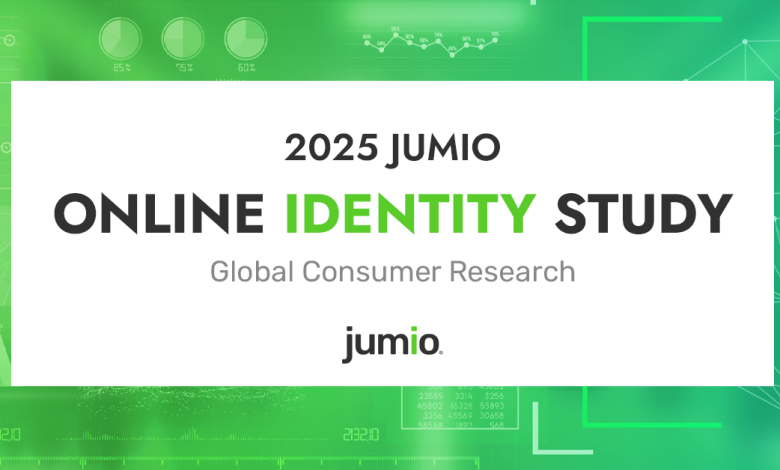2025 Jumio Online Identity Study Reveals Crumbling Consumer Trust in Digital Life
New Global Research Illuminates Eroding Confidence in Digital Spaces and Strong Consumer Desire for Greater Protection Online

Jumio, the leader in Artificial Intelligence (AI)-powered identity intelligence anchored in biometric authentication, automation and data-driven insights, today released the 2025 Jumio Online Identity Study, the fourth installment of its annual global consumer research. This year’s results paint a stark picture: trust in digital life is crumbling under the weight of deepfakes, misinformation, and cybercrime.
The 2025 Jumio Online Identity Study examined the views of more than 8,000 adult consumers, split evenly across the US, the United Kingdom, Singapore, and Mexico. Sixty-nine percent of respondents say AI-powered fraud now poses a greater threat to personal security than traditional forms of identity theft. This number rises to 74% in Singapore, with 71% also indicating that AI-generated scams are harder to detect than traditional scams. Globally, confidence in online authenticity continues to erode amid growing fears of manipulated content and AI-driven deception.

2025 Jumio Online Identity Study: Digital Trust Impacted as Concerns About AI Escalate
Seven out of ten global consumers (69%) indicated in the 2025 Jumio Online Identity Study that they are more sceptical of the content they see online due to AI-generated fraud than they were last year. Just 37% of consumers said they more strongly believe that most social media accounts are authentic compared to last year, and only 36% claimed they were more trusting of news they encounter online, despite the possibility of encountering deepfakes or manipulated content.
The majority of respondents also cited day-to-day worries around a number of AI-powered fraud tactics, including:
- Fake digital IDs generated with AI (76% globally, 84% in Singapore)
- Scam emails using AI to trick people into giving away passwords or money (75% globally, 82% in Singapore)
- Video and voice deepfakes (74% globally, 83% in Singapore)
- Being fooled by manipulated social media content (72% globally, 81% in Singapore)
The results of the 2025 Jumio Online Identity Study indicate that consumers increasingly recognise the risks of conducting life and business online, but may lack the tools or evidence needed to identify secure, authentic content.
“As generative AI continues to lower the barrier for sophisticated scams, Jumio’s findings highlight an urgent need for businesses to rethink digital identity protection—not only to reduce fraud, but also to preserve customer trust and digital engagement itself,” explained Bala Kumar, Chief Product and Technology Officer at Jumio.

As Consumers Prepare for Industrialised AI Fraud, They Look to Tech Companies for Leadership
In the absence of strong regulatory protections, consumers are taking matters into their own hands. When asked who they trust most to protect their personal data from AI-powered fraud, 93% said themselves, far more than those who trust government agencies (85%) or Big Tech (88%). But self-reliance does not mean consumers want to go it alone. In fact, when asked who should be most responsible for stopping AI-powered fraud, 43% pointed to Big Tech, compared to just 18% who chose themselves.
The 2025 Jumio Online Identity Study identifies this trust gap as symptomatic of a rapidly evolving threat landscape, where fraud-as-a-service (FaaS) ecosystems flourish across dark web marketplaces. These plug-and-play toolkits enable even novice fraudsters to launch sophisticated attacks using synthetic identities, deepfake videos, and botnet-driven account takeovers.
This shift, according to the 2025 Jumio Online Identity Study, is forcing companies to modernise fraud defences and rethink how they protect consumers in an AI-driven world. In parallel, Jumio’s research found that consumers are open to the additional steps this may require. Most respondents globally said they would be willing to spend more time completing comprehensive identity verification processes, especially in sectors where stakes are high, like banking and financial services (80%), government services (78%), and healthcare (76%).

Looking Forward: Consumers Deserve Cutting-Edge Security and Transparency from Business
As consumers continue to live, work, and play in digital spaces, enterprises must provide more sophisticated security to combat AI-powered fraud. Enterprises will have to adopt proactive strategies that blend cutting-edge verification, real-time monitoring, and a zero-trust approach to digital security from a technological standpoint. But strong technology alone isn’t enough. Businesses must also earn consumer trust in these protections.
“Our industry must develop the tools we need to stay ahead of the AI-fraud arms race, because traditional identity verification isn’t going to cut it anymore. From multi-modal biometrics to connected data, Jumio is committed to putting the next generation of identity intelligence in the hands of enterprises,” explained Jumio CEO Robert Prigge. “However, we must ensure we take consumers on this journey too. Building a trustworthy digital world depends on strong consumer education and transparency.”
Find additional data and insights from the 2025 Jumio Online Identity Study here.




